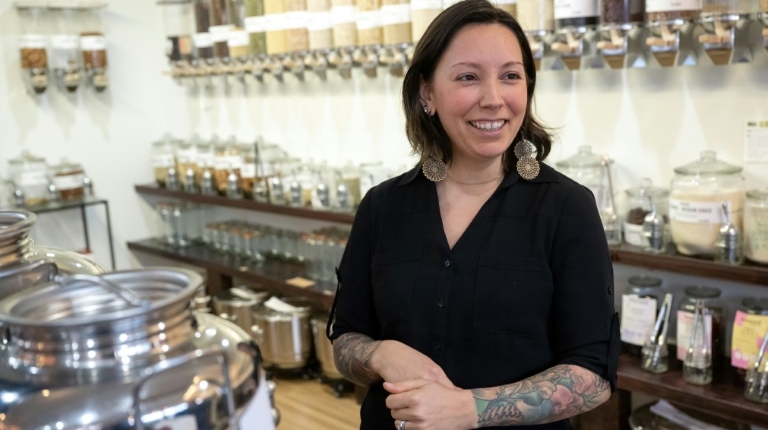Washington-area refill shops, such as the FullFillery and Mason & Greens, encourage customers to reuse containers and purchase items in bulk to reduce plastic waste. Plastic recycling can only be done a few times before its polymers break down, and many types of plastic are not widely recyclable. Therefore, reducing and reusing plastic products is critical for a sustainable future. Individuals cannot solve the plastic waste issue alone, as shared responsibility among corporations, governments, and waste handlers is necessary for a greener future. Refill shops promote a more sustainable future, but corporations, governments, and waste handlers must take shared responsibility to create a sustainable future. Ultimately, bulk sales can significantly reduce waste, as customers only purchase what they need, which can help eliminate a product’s entire lifecycle impacts.
Toothpaste Tablets and Syrup on Tap: The Rise of Zero-Waste Refill Shops in the US
Consumers have grown accustomed to the sound of crinkling plastic wrap when purchasing household goods and groceries. However, this sound is absent in zero-waste refill stores, such as Mason & Greens in Washington, which are cropping up across the US. These shops encourage customers to bring their own containers, from used jars to Tupperware, to fill with bulk items, ranging from beans and oats to vinegar and olive oil. The refill store even has customers who bring in their newspaper sleeves.
The need for this cultural shift is due to the US generating 4.9 pounds of waste per person, per day, according to government statistics. Anna Marino, the 34-year-old owner of Mason & Greens, aims to help everyone, from beginners to experts, reduce their waste by offering package-free, artisanal bread, veggies, vegan food, and products such as reusable “paper” towels made of cloth.
Marino is determined to keep prices accessible for everyone, and for bulk items, customers pay by weight. They can purchase reusable containers, such as mason jars if needed. Upstairs, the store offers a variety of hygiene products, including shampoo bars, and toothpaste tablets that are chewed until they become paste.
Jenny Gitlitz of the advocacy group Beyond Plastics advocates for the reduction of plastic consumption, as plastics contain toxins that can be carcinogenic or cause genetic mutations, as well as endocrine disruptors. Moreover, microplastics have been found in virtually every environment, including the human body, lungs, and blood, which indicates that the current recycling rate is insufficient to tackle the plastic crisis.
Zero-waste refill shops such as Mason & Greens offer a solution to these issues by eliminating the need for plastic packaging. Marino asks suppliers to send shipments in compostable or minimal packaging, and customers pay by weight to avoid an “obnoxiously outrageous price” while keeping prices accessible. It is these types of stores that can contribute to reducing waste in one of the world’s largest consumer economies.
Plastic Recycling: The Importance of Reduce and Reuse
Plastic recycling has become a common practice, but did you know that plastic can only be recycled a few times before its polymers break down? Moreover, many types of plastic are not widely recyclable in the first place. As such, individuals should focus on reducing and reusing plastic products.
According to Professor Shelie Miller at the School for Environment and Sustainability at the University of Michigan, “If all else fails, then recycle.” However, Miller cautions that the issue of plastic waste cannot be resolved solely by individual actions. Corporations, governments, and waste handlers must take shared responsibility to create a sustainable future.
Washington-area refill shops, such as the FullFillery and Mason & Greens, encourage customers to reuse containers and purchase items in bulk. The FullFillery makes body care and cleaning products on-site for refill or purchase in returnable containers. Mason & Greens sells package-free artisanal bread, veggies, vegan food, and hygiene products, including shampoo bars and toothpaste tablets that are chewed until they become paste.
Bulk sales can significantly reduce waste, as customers only purchase what they need. This can help eliminate a product’s entire lifecycle impacts, from the resources used to create it to the methane released when unused organic waste decays in landfills. The FullFillery and Mason & Greens have experienced success, but as Rini Saha, co-owner of the FullFillery, noted, “I don’t think it’s as profitable as a disposable business.” Nevertheless, reducing plastic waste is necessary for a sustainable future.
Plastic recycling is not enough, and reducing and reusing plastic products is critical. Refill shops, such as the FullFillery and Mason & Greens, promote a more sustainable future. However, individuals cannot solve the plastic waste issue alone. Shared responsibility among corporations, governments, and waste handlers is necessary for a greener future.
Don’t miss interesting posts on Famousbio










